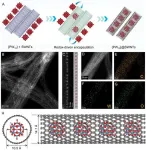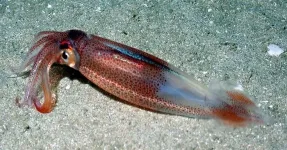Henry Ford Health researchers launch clinical trial studying therapy aimed at causing brain cancer cells to self-destruct
The study focuses on high-grade astrocytomas and glioblastoma, which is the most malignant of all brain tumors.
2023-06-08
(Press-News.org) DETROIT (June 8, 2023) – Researchers in the Hermelin Brain Tumor Center at Henry Ford Health are leading a Phase I clinical trial studying the maximum tolerated dose of an oncolytic adenovirus, a mutated virus engineered to selectively replicate in and destroy cancer tissue, in combination with fractionated stereotactic radiosurgery among patients who are undergoing resection of a recurrent high-grade astrocytoma brain tumor.
“The participants in this study have progressive high-grade astrocytoma as well as glioblastoma, and are scheduled to undergo repeat surgery,” said Tobias Walbert, M.D., Ph.D., principal investigator of the study and co-director of the Hermelin Brain Tumor Center at Henry Ford Health. “After the removal of as much tumor tissue as possible, a modified oncolytic adenovirus is injected into the wall of the resection cavity and any residual tumor tissue. The goal of this study is to determine the maximum tolerated dose of the injected adenovirus, which is engineered to selectively replicate in and destroy cancer tissue.”
This treatment is combined with a combination of oral 5-fluorocytosine and valganciclovir prodrug therapy, which are designed to only become toxic once they are inside tumor cells. This is known as “suicide-gene therapy,” as these prodrugs cause the tumor cells to self-destruct. Following the surgery to remove as much tumor tissue as possible, patients will be treated with fractionated radiosurgery, which is a process in which the total dose of stereotactic radiation is divided into several doses administered to the patient’s remaining brain tumor tissue on separate days of treatment.
“This study will help advance medical research data on oncolytic adenovirus mediated double suicide-gene therapy in patients with high-grade astrocytoma,” said Farzan Siddiqui, M.D., Ph.D., co-investigator of the study and radiation oncologist at Henry Ford Health. “Gathering data on the maximum tolerated dose in combination with fractioned stereotactic radiosurgery will be essential to understanding the full potential therapeutic benefit to patients.”
When a cancer cell self-destructs, the activated prodrug inside it may be passed on to neighboring tumor cells. This is known as a “bystander effect,” and it may allow a single infected cancer cell to not only destroy itself, but also several other cancer cells around it. Additionally, when cancer cells self-destruct in this manner, they may attract immune cells that work to clear the body of dead and dying cells. If many cancer cells self-destruct at once, it may potentially provoke an immune system response against any remaining tumor cells.
Since 1993, Henry Ford’s Hermelin Brain Tumor Center has been recognized by the National Cancer Institute (NCI) as a national leader for delivering leading brain tumor therapies. Henry Ford was among a select group of the nation’s centers, and the only one in Michigan, chosen to participate in the NCI-funded Adult Brain Tumor Consortium and Brain Tumor Trials Collaborative. As a major contributor to The Cancer Genome Atlas, a landmark cancer genomics program that molecularly characterized over 20,000 primary cancers, the Hermelin Brain Tumor Center at Henry Ford has the third largest tumor bank in the world with more than 3,000 brain tumor tissue samples and corresponding data for treatments and outcomes.
To learn more about the study, visit clinicaltrials.gov/ct2/show/NCT05686798.
###
About Henry Ford Health
Serving communities across Michigan and beyond, Henry Ford Health is committed to partnering with patients and members along their entire health journey. Henry Ford Health provides a full continuum of services – from primary and preventative care, to complex and specialty care, health insurance, a full suite of home health offerings, virtual care, pharmacy, eye care and other healthcare retail.
It is one of the nation’s leading academic medical centers, recognized for clinical excellence in cancer care, cardiology and cardiovascular surgery, neurology and neurosurgery, orthopedics and sports medicine, and multi-organ transplants. Consistently ranked among the top five NIH-funded institutions in Michigan, Henry Ford Health engages in more than 2,000 research projects annually. Equally committed to educating the next generation of health professionals, Henry Ford Health trains more than 4,000 medical students, residents and fellows every year across 50+ accredited programs.
With more than 33,000 valued team members, Henry Ford Health is also among Michigan’s largest and most diverse employers, including nearly 6,000 physicians and researchers from the Henry Ford Medical Group, Henry Ford Physician Network and Jackson Health Network.
The health system is led by President and CEO Robert G. Riney and serves a growing number of customers across 250+ locations throughout Michigan including five acute care hospitals, two destination facilities for complex cancer and orthopedics and sports medicine care, three behavioral health facilities, primary care and urgent care centers.
END
ELSE PRESS RELEASES FROM THIS DATE:
2023-06-08
It is well known that early resuscitation with cardiopulmonary resuscitation (CPR) and an automated external defibrillator (AED) saves lives, and in most sports-related sudden cardiac arrest events, trainers or medical personnel respond and initiate protocols to resuscitate a player while other athletes standby. However, time to treatment is critical, so the ability for a fellow athlete to recognize sports-related sudden cardiac arrest and initiate resuscitation while medical personnel arrive is crucial in a life-threatening event where seconds matter. However, in a new study presented at the American ...
2023-06-08
About The Study: The results of this study suggest that state palliative care laws are associated with an increase in the likelihood of dying at home or in hospice among decedents from cancer. Passage of state palliative care legislation may be an effective policy intervention to increase the number of seriously ill patients who experience their death in such locations.
Authors: May Hua, M.D, M.S., of the Columbia University College of Physicians and Surgeons in New York, is the corresponding author.
To access the embargoed study: Visit our For ...
2023-06-08
About The Study: The findings of this study suggest that outcomes from Supreme Court decisions in 2022 that invalidated COVID-19 workplace protections, voided state laws on handgun-carry restrictions, and revoked the constitutional right to abortion could lead to substantial harms to public health, including nearly 3,000 excess deaths (and possibly many more) over a decade.
Authors: Adam Gaffney, M.D., M.P.H., of Harvard Medical School in Boston, is the corresponding author.
To access the embargoed study: Visit our For The Media website at this ...
2023-06-08
About The Study: The results of this investigation suggest artificial intelligence (AI) can estimate best-corrected visual acuity directly from fundus photographs in patients with diabetic macular edema, without refraction or subjective visual acuity measurements, often within one to two lines on an Early Treatment Diabetic Retinopathy Study chart, supporting this AI concept if additional improvements in estimates can be achieved.
Authors: Neil M. Bressler, M.D., of the Johns Hopkins University School of Medicine in Baltimore, and Editor, JAMA Ophthalmology, is the corresponding author.
To access the ...
2023-06-08
An international team of researchers has unlocked a large-scale genomic analysis of Setaria or foxtail millet, an important cereal crop. The study, led by researchers at the Chinese Academy of Agricultural Sciences and including scientists at NYU, advances our understanding of the domestication and evolution of foxtail millet, as well as the genetic basis for important agricultural traits.
“Foxtail millet is considered to be the foundation for early Chinese civilization,” said Michael Purugganan, the ...
2023-06-08
New York, NY—June 8, 2023—Energy storage plays a crucial role in our transition to cleaner and more sustainable energy sources. It enables us to store excess energy when it’s available, from renewable sources like wind and solar, and use it when demand is high or supply is limited. This helps stabilize the grid, reduces reliance on fossil fuels, and mitigates the impact of intermittent energy sources.
Balancing consumer demands with power system capacities
In many parts of the ...
2023-06-08
A study of the DNA of more than 55,000 people worldwide has shed light on how we maintain healthy blood sugar levels after we have eaten, with implications for our understanding of how the process goes wrong in type 2 diabetes.
The findings, published today in Nature Genetics, could help inform future treatments of type 2 diabetes, which affects around 4 million people in the UK and over 460 million people worldwide.
Several factors contribute to an increased risk of type 2 diabetes, such as older age, being overweight or having obesity, physical inactivity, and genetic predisposition. If untreated, type 2 diabetes can lead to complications, including eye and foot problems, ...
2023-06-08
Carbon nanotubes (CNTs) are considered ideal electrochemical energy storage materials due to their high electrical conductivity, large theoretical surface area, and good chemical stability.
However, CNTs tend to aggregate due to strong van der Waals forces, which reduces their electrochemically active area. This problem is even worse for single-walled carbon nanotubes (SWNTs) due to their high length-to-diameter ratio.
Recently, a joint research team led by Dr. WANG Xiao from the Shenzhen Institute of Advanced Technology (SIAT) of the Chinese ...
2023-06-08
Cephalopods are a large family of marine animals that includes octopuses, cuttlefish and squid. They live in every ocean, from warm, shallow tropical waters to near-freezing, abyssal depths. More remarkably, report two scientists at University of California San Diego in a new study, at least some cephalopods possess the ability to recode protein motors within cells to adapt “on the fly” to different water temperatures.
Writing in the June 8, 2023 edition of Cell, first author Kavita J. Rangan, ...
2023-06-08
Prostate cancer is the most common non-skin cancer in men worldwide. According to international estimates about one in six men will get prostate cancer during their lifetime and worldwide, over 375’000 patients will die from it each year. Tumor resistance to current therapies plays an essential role in this and new approaches are therefore urgently needed. Now an international research team from the University of Bern, Inselspital Bern and the University of Connecticut (USA) has identified a previously unknown weak spot in prostate cancer ...
LAST 30 PRESS RELEASES:
[Press-News.org] Henry Ford Health researchers launch clinical trial studying therapy aimed at causing brain cancer cells to self-destruct
The study focuses on high-grade astrocytomas and glioblastoma, which is the most malignant of all brain tumors.


